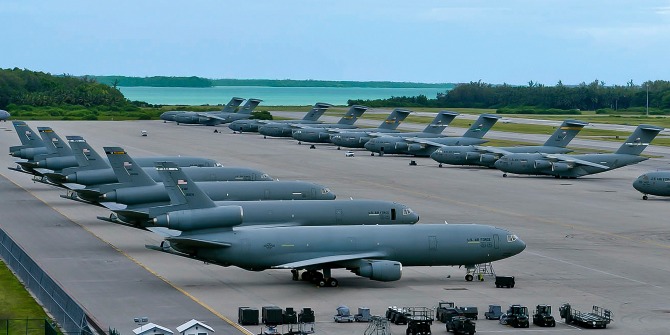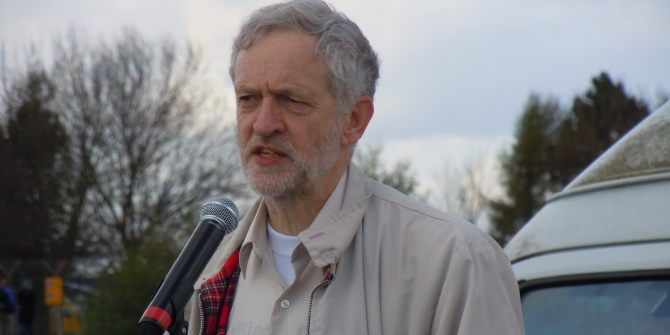 While the strength of the US-UK ‘special relationship’ has waxed and waned in recent years, many have viewed it as being generally beneficial. Peter Harris writes on one major casualty of the special relationship – the Chagos Islanders. Evicted from their home nearly 50 years ago, the Chagos Islands were converted into the US military base, Diego Garcia. Despite a 2000 High Court ruling that the islanders’ exile had been illegal, strategic considerations have since stood in the way of their return. Obama’s visit to the UK is an opportunity to reopen the issue.
While the strength of the US-UK ‘special relationship’ has waxed and waned in recent years, many have viewed it as being generally beneficial. Peter Harris writes on one major casualty of the special relationship – the Chagos Islanders. Evicted from their home nearly 50 years ago, the Chagos Islands were converted into the US military base, Diego Garcia. Despite a 2000 High Court ruling that the islanders’ exile had been illegal, strategic considerations have since stood in the way of their return. Obama’s visit to the UK is an opportunity to reopen the issue.
Like so many presidents and prime ministers before them, Barack Obama and David Cameron are working hard this week to convince observers that the alliance between their two countries is strong. Members of the British press corps in particular are predictably waiting on tenterhooks for the words “special” and “relationship” to be uttered in succession. But what exactly is the special relationship? Why are some officials so keen to trumpet its continued existence? And are there any aspects of it that ought to be ditched?
Traditionally, the concept of the special relationship evokes the image of untypically high levels of cooperation between two sovereign nations. In particular, close relations are said to exist between Britain and the United States in terms of defence and military affairs, intelligence sharing, and nuclear technology. This has been so since at least World War II, we are told.
Viewed from this perspective, the special relationship is a good thing. Who would not want friendly relations with another sovereign state? Especially for the British, it would seem to pay handsome dividends to have a close relationship with the world’s only superpower, our benevolent “cousin across the ocean.”
Yet for others in the world, the Anglo-American special relationship is far from benign. On the contrary, it has been highly destructive—even life-destroying.
Consider the fate of the Chagos Islanders, the indigenous people of the Chagos Archipelago in the central Indian Ocean who were expelled from their homes—a British territory—during the 1960s and 1970s in order to make way for the development of a U.S. military base on Diego Garcia, the largest of the archipelago’s 60 or so tiny islets.
By the time of their expulsion, the Chagossians and their ancestors had lived on Diego Garcia and the other Chagos Islands for hundreds of years. They had been brought there by French and British colonialists in the eighteenth and nineteenth centuries—some as slaves, some as laborers—to work on coconut plantations. By the mid-twentieth century, Chagos was home to around 1,500 islanders. And then came the special relationship to tear the Chagossians’ lives asunder.
Britain during the 1960s was a world power in decline. Although staunchly allied with the United States in opposition to the Soviet Union and other communist nations, Britain’s actual ability to serve as an independent steward of the Free World was weak and waning.
The special relationship still had some life left in it, however. One innovative way that London sought to compensate for its piecemeal retreat from world affairs was to offer the US military access to some of the British Empire’s most strategic territories, especially island bases (“unsinkable aircraft carriers”). American strategists were only too keen to accept the bargain, and Diego Garcia was identified as a particularly attractive candidate for militarization. In 1971, construction work began in earnest to turn the secluded island into a communications facility and naval base.

The islanders—once essential to keeping the islands’ plantation economy functioning—now found themselves surplus to requirements. All of them, even inhabitants of islands other than Diego Garcia, were compelled to leave their homes. An entire jurisdiction—a Crown Colony—was forcibly emptied of permanent inhabitants.
In 2000, the High Court in London made an historic judgement that the islanders’ exile had been illegal. No political arrangement between London and Washington could trump the islanders’ collective right to live in their own homeland, the court ruled. Once again, however, the special relationship reared its ugly head.
Soon after the High Court’s ruling, the military base on Diego Garcia became integral to the US-led “global war on terror” and the invasions of Afghanistan and Iraq. Those responsible for maintaining close military ties between London and Washington began to worry that a resettled Chagossian population would compromise the base’s strategic usefulness.
With such considerations at the forefront of their minds, Tony Blair and his Foreign Secretary Jack Straw dutifully intervened in 2004 by using the monarch’s prerogative powers (a form of executive action) to once again remove the Chagossians’ legal right of abode in the territory—a controversial manoeuvre that was only narrowly upheld by the Law Lords in 2008.
Today, the Chagossians remain in exile. Only a handful of islanders have been allowed to return to their ancestral homeland, to tend to graves and to participate in environmental conservation initiatives. Too many have died in foreign lands, often in conditions of poverty and destitution.
British and American officials have turned their gaze from the Chagossians’ plight. Even supposed humanitarians such as David Miliband, who now heads the International Rescue Committee in New York City, vociferously defended the government’s right to keep the Chagossians in exile while he was Foreign Secretary.
The ugly truth is that the Chagossians lost their homeland—and continue to be denied a right of return—because of the special relationship, because officials in London have wanted to cater to US military needs by offering up somebody else’s territory.
Empire, colonialism, militarism, and the denial of basic human rights—all of these things are hallmarks of the special relationship when it comes to Diego Garcia and the Chagos Islands. But is it possible that the Anglo-American powers could work together to find a more just and humanitarian settlement in Chagos?
There is at least a glimmer of hope that they can, and that they might. Indeed, the Tory backbencher Henry Smith (whose constituency of Crawley is home to a large community of exiled Chagossians) used Prime Minister’s Questions this week to ask David Cameron whether he would raise the issue of the Chagossians with his American visitors.
Cameron responded that he would indeed discuss the Chagossians with Obama, although the prime minister did not commit to lobbying on the islanders’ behalf. And so this often overlooked aspect of the special relationship—this grotesque outgrowth of two state’s friendly relations—will once again be determined by decisions made by a distant power.
The recent history of the special relationship has meant unimaginable suffering for the Chagos Islanders. Twenty-first century decision-makers now have the chance to rectify this wrong.
___
Note: This article was originally published on USApp – American Politics and Policy.
 Peter Harris – Colorado State University
Peter Harris – Colorado State University
Peter Harris is an assistant professor of political science at Colorado State University, where he teaches classes on international security, US foreign policy and International Relations theory. He received his Ph.D. in Government from the University of Texas at Austin, where he was also a graduate fellow of the Clements Center for History, Strategy and Statecraft.








this is terrible storybut a few facts would be useful How many were displaced>. Where did they go?
What options were thy given and what type osf supportt?
What safeguards were offered/ about their return?
These questions are not designed to belitte the actions but thet might throw light on posible outcomes